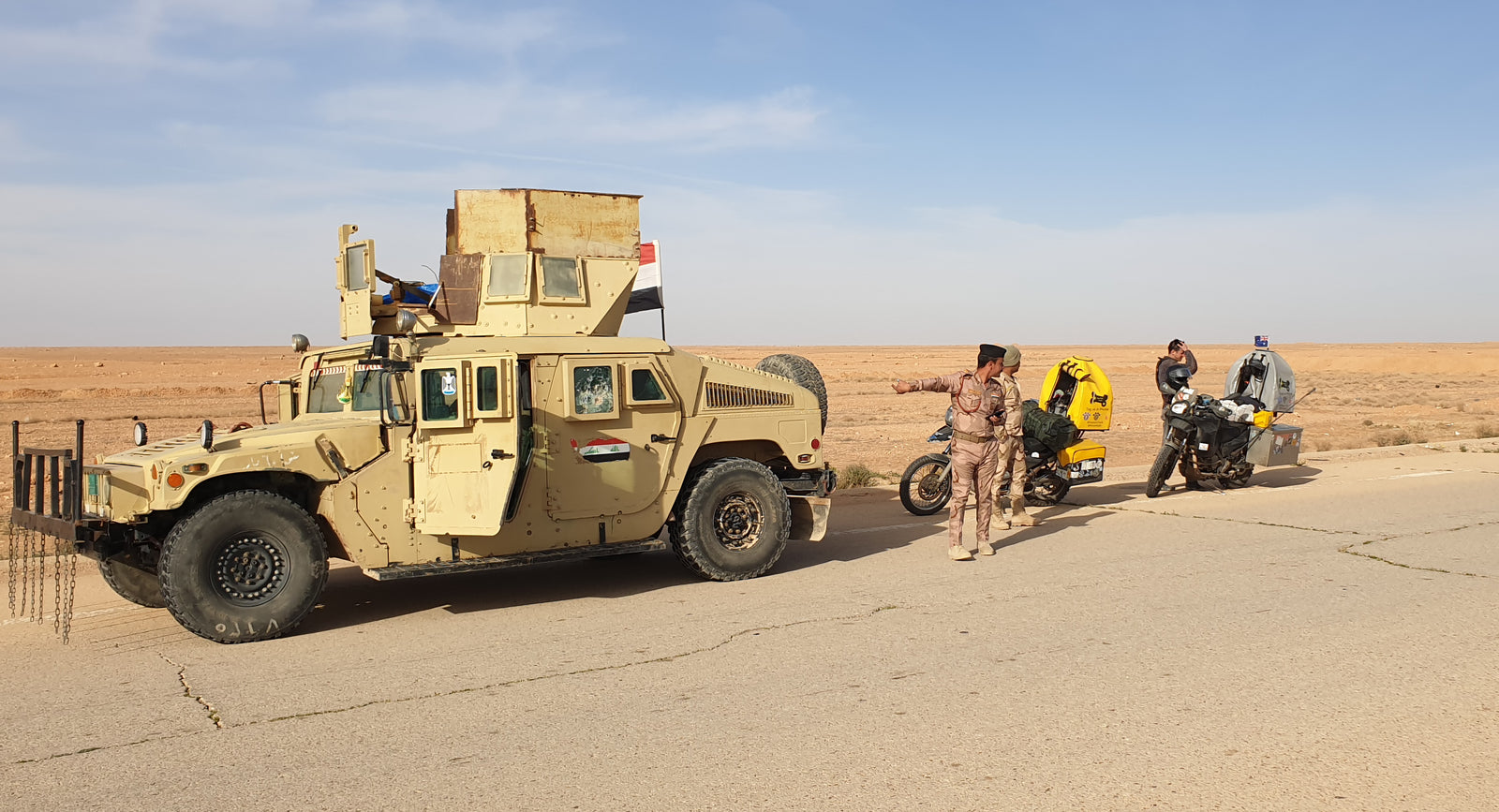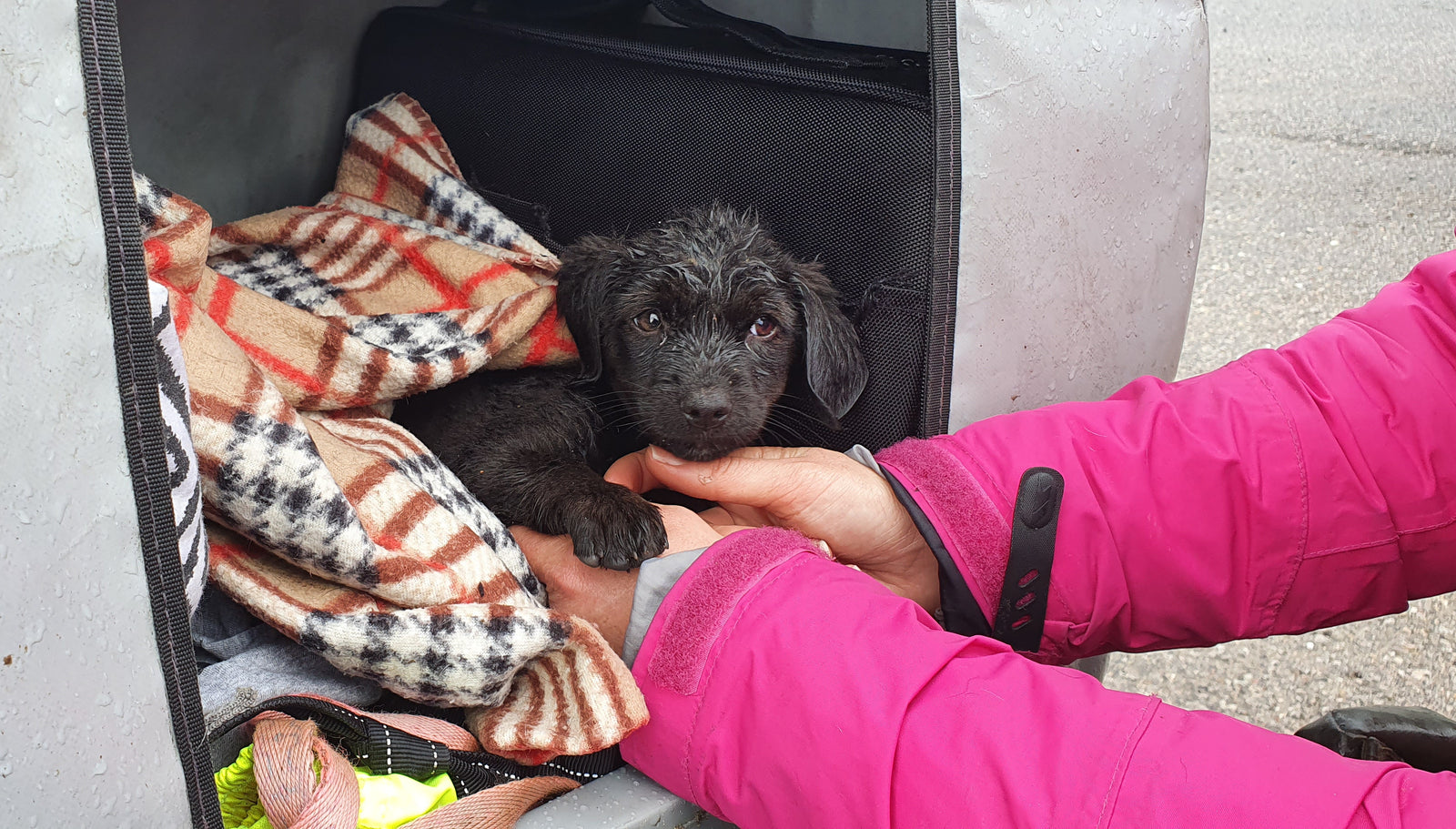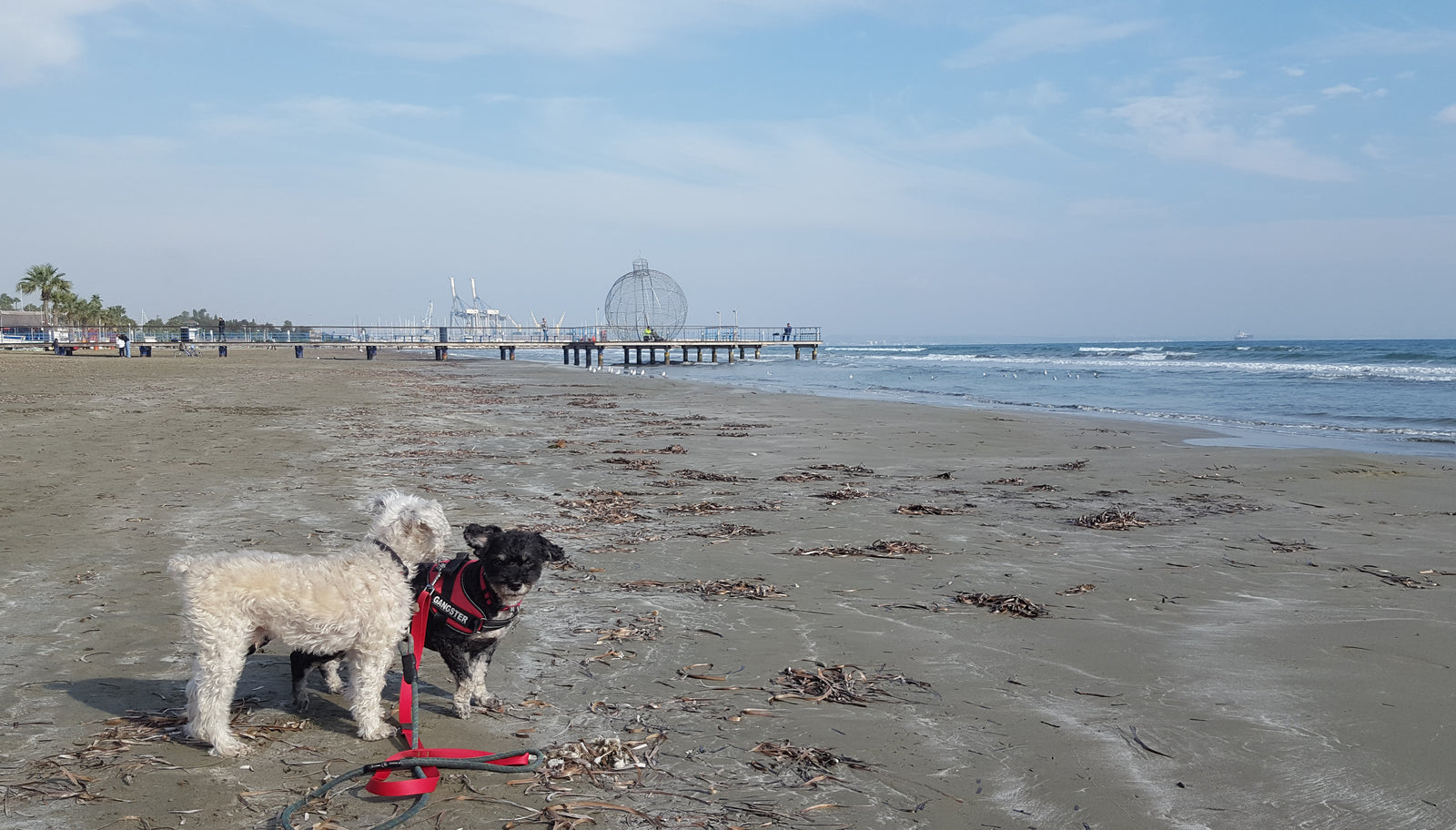Uganda and Kenya
October 09, 2017 1 Comment
Narrated Audio Blog
Told in the collective first person, jointly from Stu and Janell Clarke's perspective.
Uganda was the only country in Africa that we had both travelled to before The Pack Track. In February 2013 we spent a few days in Kampala, squeezing in a one day safari, before heading off on a cruise of the Canary Islands. Riding our motorbikes across the border and onto Ugandan territory felt poles apart from this past memory. How easy it is to fly in and out of a place, stay in a resort and then boast of having been there. If any country put our overland travels into perspective, to appreciate just how far away from Australia we were, it was Uganda.
We crossed into Uganda at Kyanika. We had to obtain an Exit Confirmation certificate for the motorbikes in Rwanda and then pass through the Police checkpoint where they registered the bikes leaving the country. Uganda had a one-stop border post which is always a sight for sore eyes, everything in one building is so much easier and quicker for us. At the Customs Office we imported the vehicles where we needed to pay 73,000 Uganda Shillings per motorcycle. It was a cash payment which we didn't have. However, the border officials let one of us ride 10km into Uganda to the nearest town, Kisoro, where we would find an ATM. We required a visa to enter Uganda. We had two options, the single country visa or the East Africa Tourist (E.A.T.) visa which covered entry into Rwanda, Uganda and Kenya (with plans to include Tanzania in the future). The E.A.T. visa was the cheaper option when visiting more than one of the countries and was available to us on entry to Rwanda but at the time we had planned to enter the Democratic Republic of the Congo which would have invalidated the visa and so we went for the cheaper option of the single country visa. Now our route was clear so it made sense to obtain the E.A.T. visa covering us for Uganda and Kenya. Finally immigration stamped our passports and we were free to proceed.
The beautiful mountains of Rwanda continued well into Uganda. It was cool riding up at around 2000m so we had to keep our layers on. There is lots to explore in Western Uganda but we decided upon a fairly direct route to Kampala and on to Entebe, passing across the Equator and stopping for the obligatory coffee and photo.
Entebe is a nice city, much nicer than Kampala but also more expensive. We camped at the Entebe Backpackers Camp for two nights and could have definitely stayed longer. It's in a very nice area; leafy green with nice roads and footpaths. There are shops within walking distance including a decent supermarket and restaurant. Camping was on a flat grassy area and there is shade if you want. Toilets and showers are very clean. Staff were very friendly and the Wifi was okay in the reception area. A big bonus was a restaurant on site with drinks. When we are camping its more complicated with Weeti and Shadow if we want to eat out. We can take them with us and they can either stay on the motorbike or sit under our table if thats allowed. We rarely leave them at the campsite because it may not be safe or secure.
The main purpose of our visit to Entebe was to visit a friend of Stu's. We spent an afternoon with Robert and his family from Uganda. Stu worked with Robert during his UN posting in South Sudan. Lake Victoria Hotel was the hotel used by Australian Peacekeepers when attending their induction training prior to embarking on their mission in South Sudan. Meeting Robert at this venue brought back many good memories while providing a relaxed environment to eat and drink and a pool for Robert's three children to enjoy. It was a perfect evening reminiscing about old times and creating new memories.
Stu investigated the possibility of a quick trip into South Sudan while we were so close. During his deployment he had visited the Nimule National Park just over the border from Uganda, the region was definitely safe at the time and would likely still be the case. The safari in Nimule was back to basics, mostly conducted on foot with an armed escort. The region had been deprived of wildlife for many years due to the civil war but slowly it was returning, with elephants and hippos an easy sighting. Stu had visited the park a couple of times with his UN colleagues and thoroughly enjoyed the experience. But the situation in South Sudan had deteriorated since Stu had left and was now considered unpredictable and in many parts simply unsafe. Some might say that Stu had been single handedly holding the country together and in his absence the country had fallen apart. We decided to play it safe and steer clear, we'd seen plenty of national parks by this point and it would be very hard to guarantee the safety of the girls while we were on safari.
From Entebe we moved to Kampala for a few nights to investigate obtaining an Ethiopian visa but were unsuccessful so we continued on to Kenya. There is so much to see in Uganda, we hardly touched the surface, in fact we really just passed through. Money was very tight so much of our journey from Uganda onwards is about completing the journey.
We had high hopes for our trip through Kenya. Lots of the beautiful flowers delivered around the world originate in Kenya; grown and flown all over the world. It's also a really popular tourist destination for people wanting to see a snapshot of Africa and its stunning wildlife. By now we were pretty happy with the amount of wildlife we'd seen, we weren't going to go looking for it anymore but if it passed our way we would still stop and admire it. Now we were on the home run. From Kenya we had only three more countries to complete our African challenge with the motorbikes and our dogs, to do what so many people thought we couldn't do.
From Uganda we crossed into Kenya at the Busia border post. It was almost a one-stop border post which means getting all the forms completed, passports stamped, vehicle permits approved and fees paid in one building. What hadn't been set up yet was the vehicle component so we had to go back into Uganda to clear our motorbikes and then organise a Temporary Import Permit for the vehicles to enter Kenya. There was no fee which is always a bonus.
There were plenty of campsites to choose from on our route to Nairobi. We shopped around to get the best location and facilities for the cheapest price and found a lovely spot by Lake Naivasha National Park.
The ride into Nairobi saw the most dangerous traffic we'd seen during our entire travels. It was a Sunday afternoon and there was a heavy flow of traffic heading towards Nairobi, presumably due to the weekend coming to an end. Cars, trucks and motorbikes were all taking their lives in their hands performing ridiculous overtaking maneuvers at high speeds. As we were travelling in the general direction of traffic we were fairly safe, provided we kept room in front for overtakers to move into and stayed to the left of our lane (with vehicles driving on the left hand side of the road in Kenya). We witnessed cars overtaking cars which were overtaking themselves, using the opposite shoulder to do so and on occasion forcing vehicles in the opposite direction off the road. While trucks heading out of Nairobi were still happy to overtake other trucks and force everyone oncoming off the road. It was seriously scary and hectic. In hindsight we should have found a hotel enroute and tried again on the Monday, but we hadn't connected the traffic to the day of the week at that point and could not have expected any difference come Monday.
We needed to get to Nairobi quickly to start sorting out our Ethiopia visa. We booked a room in a 6 bedroom farmhouse about 20min drive out of the centre of Nairobi. An older lady owned the house and rented out rooms that possibly her children at one point used. There was a student renting one of the rooms long term while we were there but we didn't see any other guests. It was a challenge to find the farmhouse because as the name suggests, it was rural. The area was fascinating to us, we'd never been behind the scenes of all the cultivated regions. We looked upon these area's since Rwanda and saw all sorts of fruit and vegetables growing interspersed with farmhouses for the families and other workers. This stay had us right in there, riding through the labyrinth of narrow dirt tracks. It was fantastic for walking the dogs every day and everyone said we could help ourselves to the fruit and vegetables in the crops. It was a very kind offer but we felt uncomfortable about taking their food.
It really was a red tape saga obtaining the Ethiopia visa and for a couple of days it looked like we weren't going to be able to get it and our African adventure would be over. This had been the case for other overlanders and was a very real possibility for us. We were lucky because we were travelling with two passports and managed to fudge our way through the system with a lot of polite persistence and general annoyance to the staff at the Embassy. The Ethiopian Embassy required a letter from our country's embassy requesting the visa on our behalf and vouching for our character to a certain extent. Most country's' embassies were happy to provide this but the British High Commissioner refused, saying that no such letter should be needed. We were outraged, regardless of whether it should be needed or not, it was their requirement and the British embassy was leaving their citizens high and dry by refusing to comply. As much as we begged, the British would not see reason and stubbornly refused. The Ethiopian embassy likewise refused to proceed without the letter, pointing out that every other embassy complied and showed us evidence of letters from Germany, Slovakia, New Zealand and many others.
Sometimes the policy and system in place for visa's is designed by people who totally neglect overlanders and it's incredibly disappointing for those that don't fit in the box of fly in/fly out. In most of these cases the country can be easily avoided or an alternative arrangement can be made. But in the case of Ethiopia there was no viable alternative other than shipping. Somalia and South Sudan were in no way safe for overland travel. We had worked so hard to get to this point, 10 months riding, overcoming all sorts of obstacles only to have a single country make it so difficult for us to visit.
We turned to the Australian embassy for assistance, they said they would be happy to produce the letter for the standard fee of $50. We asked if they could include details of both our Australian and British passports and acknowledge that we are dual citizens requesting a visa for the British passport as we were currently travelling on that passport while also carrying the Australian. We didn't expect it to work but we didn't want our trip to end there. We were now less than 2,000km away from achieving our goal of riding down and up the African continent with our dogs. There was still so much we wanted to see and do. We held a passport full of visas and stamps from countries all over Africa and the World that trusted us to travel, respecting and learning their culture and we knew that Ethiopia would be a highlight if only we'd be allowed to enter.
At first the Ethiopian embassy didn't want to accept the Australian letter, insisting we must obtain a British letter for use with a British passport. But we persisted in begging, refusing to take no for an answer. After 3 days of annoyance they snatched our paperwork and disappeared. We were told to come back in the afternoon but were not really sure what would happen. When we returned the passports were waiting each with the approved visa, they had approved us finally, we just had to go to the bank to pay the fee and we'd be good to go! Our $100 gamble had paid off.
Needless to say we spent some time in Nairobi getting quotes to ship and fly us, the dogs and the motorbikes out of Kenya should the visa application fail. Time we would have preferred to relax and do sightseeing. We did however have one treat in Nairobi. A biker spotted us in the car park outside the British Embassy and pulled in to say hello. His name was Maher from Oman on a big trip around Africa with his F800GS. He was staying with a Turkish family for a few weeks in Nairobi and invited us to have dinner with them. It was a lovely evening and we really enjoyed talking to Maher who had lots to tell us about his route from Oman through Saudi Arabia and then a ferry trip to Sudan. He put us in contact with a biker club in Khartoum in Sudan who he told us would take good care of us. A contact we'd be sure to follow up on when the time came.
From the fertile green capital Nairobi, the road north to the Moyale border post into Ethiopia transitioned to Camel country with semi-arid planes. This took us by surprise a bit but we enjoyed the blue skies and sandy desert once again.
1 Response
Leave a comment
Comments will be approved before showing up.
Also in Dog Blog

Iraq
March 30, 2022 1 Comment

Turkey & Azra
March 30, 2022

Cyprus
January 12, 2022
Are you a Dog Person?
Do you Love to Ride?
Click below for more information on how you can take your best friend along on your next biking adventure
© 2026 The Pack Track.
Powered by Shopify















Karin
November 03, 2023
Hi, quite extraordinary your journey. 😁 I understand it well that you crossed from Uganda to kenya in busia with your dogs.
Did you need special papers beside the vaccinations and health certificate and prove of ownership?
I cross on 14th of November and was curious if they are strict.
Thank you.
LG Karin